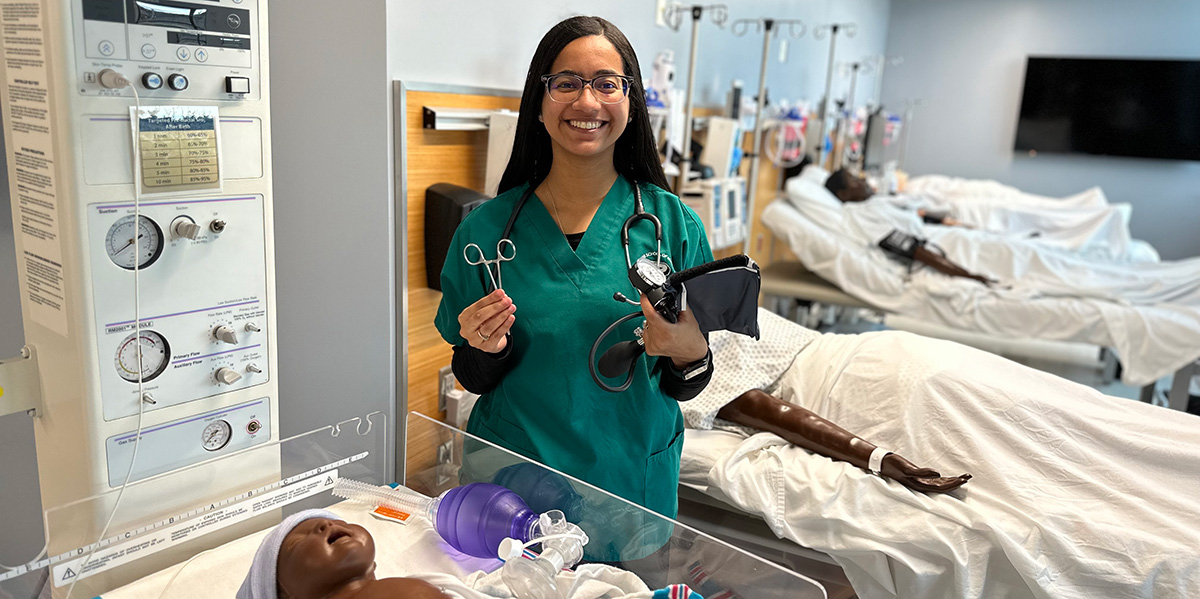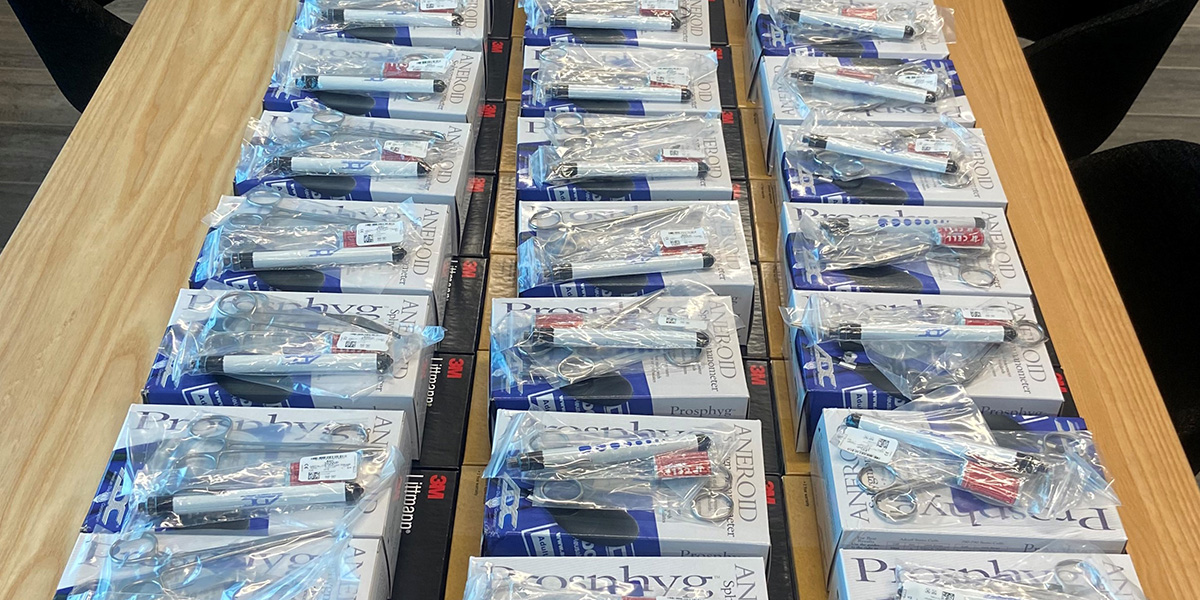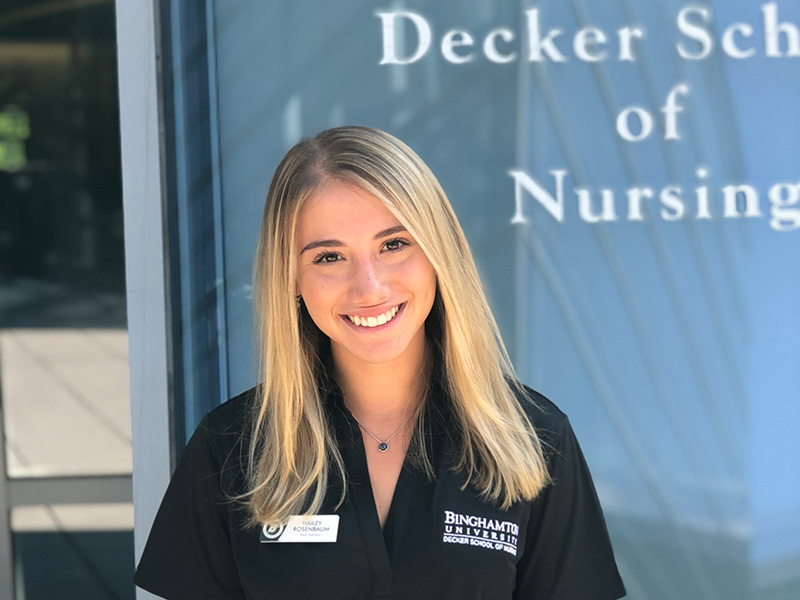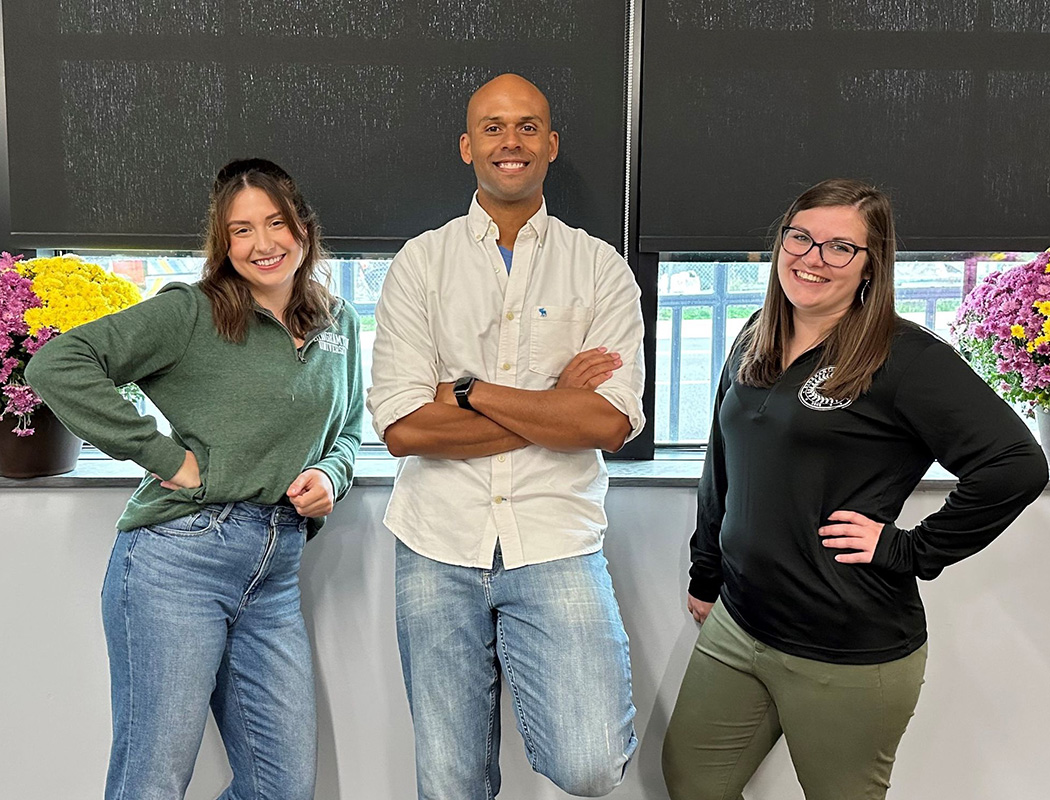Kit sponsorship program helps defray costs for undergrad nursing students

Getting a bachelor’s degree in nursing isn’t easy. In addition to the challenges other college students deal with, nursing students must also complete simulation and clinical experiences (with real patients, family members and facility staff present!). And all of this must be done with the National Council Licensure Examination for Registered Nurses (NCLEX-RN) looming in the not-to-distant-future.
Nursing school also asks a lot from students financially. There are required background checks, immunizations, insurance, uniforms and more — the costs of which add up quickly.
At Binghamton University’s Decker College of Nursing and Health Sciences, undergraduate nursing students are required to have medical assessment kits for clinical and simulation experiences beginning with their first nursing assessment course. These kits contain a professional-level stethoscope, blood pressure unit, diagnostic penlight, bandage scissors and a Kelly hemostatic clamp. Students in the college’s traditional nursing program must obtain these items by the beginning of the fall semester of their junior (third) year, while students in the Baccalaureate Accelerated Track (BAT) program must have the equipment at the beginning of their year-long program, which starts in the summer.
An assessment kit costs approximately $150, not an insignificant amount of money for many students, especially since clinical uniforms (scrubs and shoes) are required at the same time.
In 2018, to help students who might not be able to afford these necessary items, Decker College’s Division of Advising and Academic Excellence began the Assessment Kit Sponsorship program to provide donor-funded kits to students.
“The sponsorship program helps alleviate financial barriers for students, enabling them to focus on beginning their clinical coursework,” explained Aaron Irvine, academic advisor for Decker College. “The program is based on financial need, according to a list of students our office receives from the University’s Office of Financial Aid. There is no application process.”
Academic advisors contact accepted students and offer them the assessment kits. While students may decline if they don’t need or want the equipment, Irvine said most are grateful for the assistance.
“Students get very excited when they learn about the kits, and when they come into our office to pick them up, they’re always so appreciative,” he said. “Having that $150 kit paid for alleviates a lot of financial burden for the students, because they already have to pay for uniforms and textbooks.”
Delaney Smith, a BAT student from Long Island, N.Y., received her kit at the end of May, just in time for the accelerated program’s June start. She didn’t know about the assessment kit program, and was surprised and grateful when she learned she was getting the equipment at no cost.
“It’s so stressful knowing that you likely won’t be able to work throughout the better part of this accelerated program,” she said. “Every penny you save counts, so to know that I got to save extra money was a big relief.
“This program is important for Decker nursing students because it takes some extra weight off our shoulders — it’s one less thing to worry about,” Smith added. “Many of us are uprooting our entire lives for a whole year to become the best nurses we can be, but with that comes so much anxiety. With a program like this, it gives incoming nursing students one less thing to stress about.”
In Smith’s case, she had to move to the Binghamton area, which meant paying rent, furnishing an apartment and buying food. All of this was made a little easier due to the Assessment Kit Sponsorship program.
How many kits the Division of Advising has to offer each year depends on the level of funding received from sponsors. Kits have been sponsored by faculty, staff, alumni, parents/families of students and friends of the University. Anonymous donations have also been made, and any donation amount is appreciated.
Sponsors receive thank you notes written by the students who receive the equipment. In addition, the Division of Advising hosts a reception for donors and kit recipients. Although get-togethers were halted in 2020 and 2021 due to the pandemic, in 2022 the annual event was held Oct. 8, during Homecoming Weekend.
“The reception is a ‘thank you’ for the donors and allows them to connect with the students,” Irvine said. “It has also been a great networking opportunity for our students in the past.”
Hailey Rosenbaum is a 2021 graduate from Decker’s traditional nursing program. The Long Island native received a sponsored kit in fall 2019, just before starting clinical rotations in her junior year.
“There are so many different supplies necessary to purchase while in college, so having a generous sponsor to assist financially meant a lot to me,” she said.
Today, Rosenbaum is a registered nurse in a high-risk obstetric unit at North Shore University Hospital. She and her family are also assessment kit sponsors.
“When my older sister, Sophie, graduated from Decker in 2020, my family decided to sponsor a kit in her honor. Then, when I graduated from Decker in 2021, my family decided to continue the tradition and sponsor one kit in honor of each of us per year,” Rosenbaum explained.
She added that the tradition will likely continue — and grow by an additional kit each year — since her younger sister, Jessie, is now a Decker nursing student who is set to graduate in 2024.
“I want to thank my generous sponsor from four years ago and encourage others to sponsor assessment kits or to help assist Decker students in any way they can,” Rosenbaum said. “My family has sponsored these kits for a few years, and will continue to do so. Nursing school is incredibly challenging in itself, so having this type of assistance is so appreciated!”
Rosenbaum added that not only do initiatives like the Assessment Kit Sponsorship program help students financially, but they also send the message that “past and present members of Decker, as well as other people involved in Decker, are always available to assist in any way.”
In the previous two years, donors have enabled the Division of Advising to award just over 60 kits to students. While staff are proud of this achievement, they’re hoping to increase sponsorship.
“Ultimately, we’d like to have enough funding so we can eliminate this financial burden for all our undergraduate nursing students,” Irvine said.
One way the Division of Advising hopes to raise funds is by offering Decker College faculty and staff the opportunity to dress casually on Fridays for a small ($2 per week) donation. Launched in October 2022, “Casual for a Cause” has already begun to pay off, literally!
Other Decker programs to help reduce students’ financial barriers
In spring 2021, Decker’s Division of Advising and Academic Excellence began a uniform loan program for undergraduate nursing students. Students graduating from the traditional and BAT nursing programs donated used scrub tops and bottoms to the next cohort of students, saving them money, recycling the clothing and further connecting the students. Students who receive the uniforms are asked to return them to the division upon graduation, so they may continue benefitting future students.
New in 2022 is a food pantry for the University’s Health Sciences Campus (HSC), home to Decker College and the School of Pharmacy and Pharmaceutical Sciences. Students can place an order with the food pantry and then pick up their order at the Pharmacy School.
The Health Sciences Campus also hosts a professional clothing closet for Decker and SOPPS students. Available are a variety of clothing, shoes and accessories for professional settings. The HSC Professional Clothing Closet is located in Room 121 of the Pharmacy Building, and is open the first and third Thursdays of each month.



